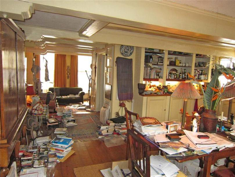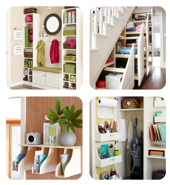Resolved: I will get more organized

So . . . who has accomplished the dreaded “get organized” resolution? Who has not?
It seems a daunting task when you consider it – there’s the correspondence and the junk mail and the bills to be paid, closets and the junk drawer(s), the kitchen and the bathrooms and the mudroom . . . It’s so overwhelming, the majority of us just decide that it’s too much, and the chore is assigned to the “later” category which usually means it is never finished.
Studies have shown that messy homes and work spaces can contribute to feelings of helplessness, anxiety and overwhelming stress. The excessive stimuli from all of the “stuff” and the desire to take care of it can make it more difficult to relax, or to focus on any task at hand.
Organizing – and staying organized – is more than a one-time chore. It requires dedication and some lifestyle changes. After determining a plan and following through by sorting and placing things, you must continue to make sorting and organizing a part of every day.
Go room by room and decide what belongs there, and what should be put someplace else. Having dedicated containers for each room helps – if you find something that belongs in a particular room, place it in the basket or container and at the end of each day (or week), return the items to the proper place. If you are walking through a room and find something that belongs someplace else, take the two minutes it would require to put the item away.
Find storage systems that work for you. There are dividers for drawers and shelves, shelving units for garages or studies or mud rooms. Shelves, cabinets, and hooks can get things up off the floor, which not only makes the items easy to find but also makes a room seem larger. The backs of doors can also be used for hanging/storing lighter items. Bins are helpful if you have children and have lots of toys, sports equipment, or outdoor gear that you want to have instant access to.
Where is the best place for your keys? The kids’ backpacks? Boots, shoes? After deciding where things belong, make it a habit to check those spots once in a while so that when you are running out the door your keys/backpacks/purse are easily found.
After deciding on your sorting/storage system, encourage all family members to make it a habit to follow it. When you finish using an item, return it to its storage location – this eliminates piles of belongings waiting to be stored, and eliminates hunting for items. If you cannot put it away immediately, put it into the appropriate room container to be taken care of later. Just like any habit or skill, the more you practice it, the more routine it will become, and you’ll be able to find anything (well, most things) when you want them.